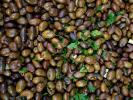
SIMBIOLIVA Operational Group: New biotechnological solutions for a circular economy of alperujo
- Type Operational group
- Status In progress
- Execution 2024 -2027
- Assigned Budget 579.152,32 €
- Scope Supraautonómico
- Autonomous community Andalucía; Castilla y León; Madrid, Comunidad de
- Main source of financing CAP 2023-2027
- Project website GO SIMBIOLIVA
SIMBIOLIVA proposes a strategy based on physical and chemical processes (three-phase centrifugation and increased temperature during thermomixing, which reduces the presence of polyphenols by solubilizing them), along with biological treatments, applying a load of specific microorganisms that ultimately degrade the polyphenols in the olive oil, thereby reducing treatment times. This will allow us to obtain a system that results in a Nature-Based Solution that has a direct and positive impact on the olive and agricultural sectors.
For the San Pablo CEU University, the project involves the development of microbial consortia that allow the properties of olive oil to be improved as a substrate. The aim is to develop microbial communities that allow the reduction of polyphenols present in olive oil and, as far as possible, improve the properties of the product as an organic amendment. The creation of these consortia is extremely useful for the oil industry and will allow the university to generate a nature-based solution for the sector. This technology presents important advantages as a means of decontaminating products and generating solutions with reduced energy costs and with lower installation requirements, given that its action will be based on the growth of organisms in the medium itself.
For the company DMC, the project will allow the identification of new communities of microorganisms that improve plant development. This will allow the obtaining of new biostimulants that improve plant development and resist different types of abiotic stress. It will also collaborate in the development of new media that allow the survival and interaction of microorganisms with the plant to be improved. Currently, there are stimulant products for plants based on microorganisms, but it is necessary to improve their application through media that improve their interaction with the soil and roots. These communities on an improved support will also interact with the new organic amendment developed, alperujo, thus allowing the generation of a new medium with improved properties that favor the development of different plant species.
For El Ejidillo, the project will involve the development of new substrates that improve the interaction between soil, plant and microorganism. It will also evaluate the impact of biostimulants and treated alperujo as a whole on different species of agricultural, forestry and ornamental interest. In this way, knowledge will be increased in relation to the new organic amendment in interaction with beneficial soil bacteria. In this way, new methodologies will be available for improving soil fertility through organic amendments and their interaction with beneficial soil microorganisms. These techniques are key to improving the resilience of soil fertility in our current climate change conditions and can be applied to all types of Green Infrastructures.
SIMBIOLIVA will achieve four key results, which are:
- Polyphenol extraction process: This process allows for a reduction in their presence in the alperujo and facilitates their possible future valorization.
- Biological treatment: To reduce the polyphenols present in the alperujo after the extraction process
- Biofertilizer: Development of biofertilizers (bacterial consortium) improved with polymeric additives Development of a new soil symbiotic (organic amendment + biofertilizers)
- Obtaining process that allows for sustainable use of alperujo within a circular economy
- Act. 1 R1: Definition of physical and chemical properties of the initial and final alperujo (Period 1) Define the initial variability of the alperujo and the final requirements after its treatment.
- Act. 2 R1: Development of process conditions in the laboratory (Period 1) Objective: To develop the process of valorisation of polyphenols.
- Act. 3 R1:Implementation of the process in the olive oil mill Validate the process on a pilot scale.
- Act. 4 R1: Development of the pilot physical-chemical process. Optimize the pilot process.
- Act. 1 R2: Determination of organisms of interest and biological process Identify a bacterial consortium that degrades recalcitrant compounds.
- Act. 2 R2: Development of biological treatment in the laboratory.
- Act. 3 R2: Determination of effects on the substrate and plant species.
- Act. 4 R2: Validation of the pilot biological treatment process.
- Act. 1 R3: Definition of biofertilizers of interest and improving substances Identify potential biofertilizer consortia.
- Act. 2 R3: Development of additives to improve organisms of interest Select additives to improve the survival and effect of PGPR.
- Act. 1 R4: Integration of functionalities and field validation Integrate the organic amendment with the improved biofertilizers to generate a symbiotic (amendment + fertilizer).
The global olive oil sector produces between 17 and 22 million tons of olives, generating between 13 and 18 million tons of olive pomace, with Spain accounting for 45% of this production. Climate change and the increase in olive cultivation increase the threats to the sector. Climate fluctuations (such as Filomena and DANAS) and rising maximum temperatures negatively impact the sector. In 2022, the high cost of natural gas forced some olive pomace oil extraction plants to halt operations, harming the sector.
Soil erosion is also a concern, with 30% of Spain affected by erosion and an average soil loss of 14.16 t/ha in 2017. SIMBIOLIVA is exploring new ways to enhance the value of alperujo and develop products that protect Mediterranean soils and improve crop resilience. The circular economy, promoted by the EU, involves sharing, reusing, repairing, refurbishing, and recycling materials to extend product lifecycles.
The development of circular economy processes faces political, cultural, financial, and technological barriers. Key aspects include regulating the use of alperujo, project dissemination, access to financing, and experience in valorizing byproducts and soil solutions.
SIMBIOLIVA proposes a strategy based on physical-chemical and biological processes that, on the one hand, allow us to reduce the presence of polyphenols by solubilizing them, and on the other, manage to reduce treatment times, achieving a nature-based solution that has a direct and positive impact on the olive sector and that can be extrapolated to other crops in the agricultural sector
Result 1: Polyphenol extraction process.
- Act. 1 R1: Definition of physical and chemical properties of the starting and final alperujo (Period 1) Define the initial variability of the alperujo and the final requirements after its treatment.
- Act. 2 R1: Development of process conditions in the laboratory (Period 1) Objective: To develop the polyphenol valorization process. Act. 3 R1: Implementation of the process in the olive press. Validate the process on a pilot scale.
- Act. 4 R1: Development of the pilot physical-chemical process. Optimize the pilot process.
Result 2: Biological treatment.
- Act. 1 R2: Determination of organisms of interest and biological process. Identify a bacterial consortium that degrades recalcitrant compounds. Act. 2 R2: Development of biological treatment in the laboratory.
- Act. 3 R2: Determination of effects on the substrate and plant species Act. 4 R2: Validation of the pilot biological treatment process.
Result 3: Biofertilizer.
- Act. 1 R3: Definition of biofertilizers of interest and improving substances Identify potential biofertilizer consortia.
- Act. 2 R3: Development of additives to improve organisms of interest Select additives to improve the survival and effect of PGPR.
Result 4: New soil symbiotic.
- Act. 1 R4: Integration of functionalities and field validation Integrate the organic amendment with the improved biofertilizers to generate a symbiotic (amendment + fertilizer).
- Coordinator/entity name: AGRO-FOOD COOPERATIVES OF ANDALUSIA
- Postal address: Calle Demetrio de los Ríos, 15 41003 Seville
- Coordinator/entity email: cdiaz@agroalimentarias-andalucia.coop
- Telephone: 954422416
- COOPERATIVAS AGROALIMENTARIAS DE ANDALUCÍA
- COOPERATIVAS AGROALIMENTARIAS DE ANDALUCÍA
- DCOOP SOCIEDAD COOPERATIVA ANDALUZA
- FUNDACION UNIVERSITARIA SAN PABLO CEU
- DMC RESEARCH CENTER SL
- EL EJIDILLO VIVEROS INTEGRALES SL







